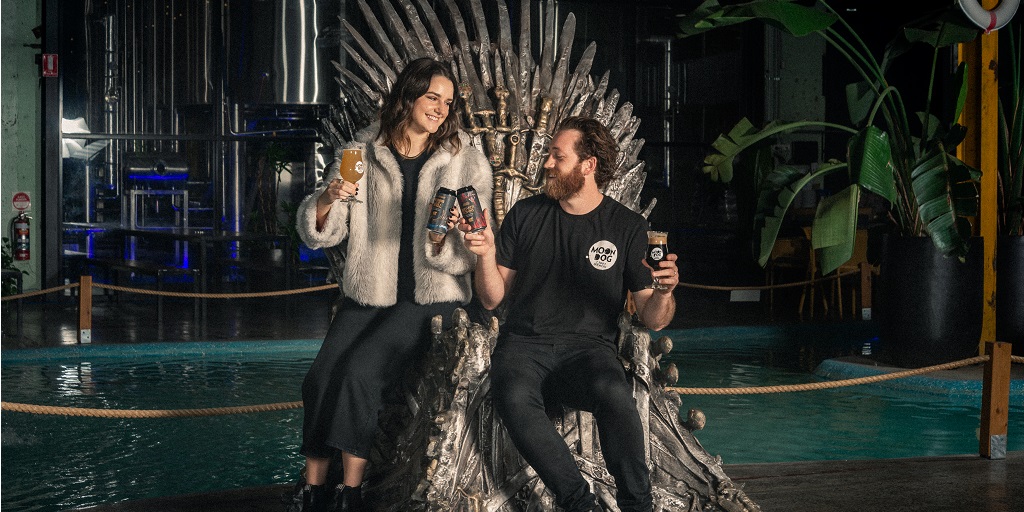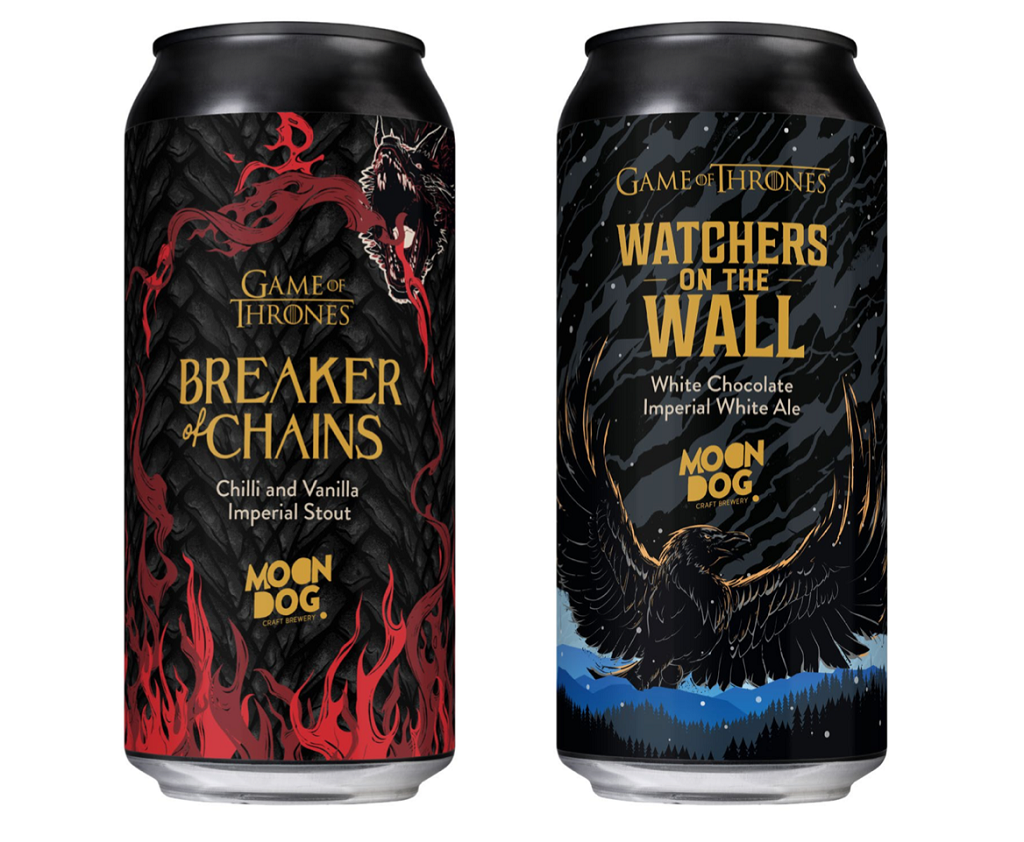
Making it official: Moon Dog's Game of Thrones beers

Melbourne’s Moon Dog Craft Brewery, like many others, is no stranger to appealing pop culture references but its latest Game of Thrones-inspired beer collaboration has taken a more official route than most.
Moon Dog teamed up with Warner Bros. Consumer Products to commemorate the 10th anniversary of TV series Game of Thrones with its Breaker of Chains Chilli and Vanilla Imperial Stout (7.7% abv) and Watchers on the Wall White Chocolate Imperial White Ale (9% abv), launched at events last weekend.
The partnership highlights not only the growing clout of craft breweries who have the tank capacity and the brand pull to leverage a deal like this, but also the changing relationship brewers and designers have with the culture that influences their beer.
Moon Dog brand manager Brook Hornung said the partnership came after the brewery was approached by the copyright owners.
“The way it came about is that Games of Thrones owners HBO and Warner Bros. locally were looking for partners for their 10th anniversary,” he explained.
“They have some other partners in other industries and they were looking for a local alcohol supplier, someone that could do something unique and fun and that’s where they thought of us and came to us. A quick litmus test of the staff and we got back a resounding yes.”
Working with a major brand
There are challenges when it comes to working with a multinational IP owner like Warner Bros.
“It’s quite different to the process we would normally go through,” explained Hornung.
“We explored lots of different options, but they were great in terms of giving us free rein on the beer side of things. There were some prescribed assets but the range of those assets was huge, we had some flexibility in what we wanted to use. Beer is certainly our area of expertise, not theirs, so they were happy to be led by us on the recipe.”
There were some substantial benefits to the official partnership too, which allowed them to leverage off of the pre-existing brand.
“It’s a great way for us to transcend the craft beer market and access the general population more broadly, and the styles of beers we’ve made are pretty challenging, although not super challenging for normal craft beer drinkers, but certainly more from an average beer drinker perspective.
“The other part is that we’re able to do some great events at Moon Dog World,” Hornung said.
“People came in that have never been to Moon Dog World before who might have travelled 10-20kms to sit on the Iron Throne. That’s a great opportunity for us, and more broadly even internally just giving our team something a little bit different, more unique and exciting to talk about, and brewers to be involved with.
“We’ve also seen lots of different media outlets that we wouldn’t normally have for any old release.
“It’s a great opportunity and they don’t come around all the time, and we’re lucky that we have the scale to be able to do that and do a national beer release, albeit as a limited run.”
Pop culture and copyright infringement
The Moon Dog and Warner Bros. partnership highlights the ongoing love affair that the brewing industry has with pop culture.
Pop culture references on can design and in beer recipes have often been discussed, especially following the proliferation of cans which allowed greater real estate for creative expression.
Over the years, however, a number of brewers – particularly in the US – have fallen foul of copyright infringement rules. Brooklyn’s Lineup Brewing was issued a cease and desist letter from Beyonce representatives for its Bïeryoncé pilsner, as did New England Beer Co. from Lucasfilm for its Imperial Stout Troopers beer.
Lucasfilm also sent a cease and desist to an Australian firm, Black Milk Clothing, for its Star Wars-themed bathing suits, but in a strange turn of events, actually ended up agreeing to licence the IP to the company.
This was a highly unusual case though, as Australian companies and particularly breweries have largely been spared from major and publicly reported legal ramifications from IP owners, but trademark and intellectual property expert James Omond of Omond & Co. said this was not necessarily because brewers weren’t engaging in ‘borrowing’ IP.
“It’s no more difficult to prove infringement in Australia than anywhere else, but to go to court is a very expensive process. There’s no simple, inexpensive tribunal for example where these matters can be dealt with,” he explained.
“We’re also maybe not on their radar as much. Generally, the IP owners we’re talking about are deep-pocketed multinationals, who don’t worry too much about the cost.
“In most cases, the simple engagement of a large, aggressive law firm that sends a five-page letter to a small brewery is going to be enough to result in that brewery ceasing and desisting. ”
Producers in Australia usually come unstuck when they try to register a name, he said. Major companies usually have ‘watching’ services in place to find potential infringements on their IP or trademarks, as The Beer Drop found out last year.
“It happens more often when the Australian brewer tries to register something as a trademark. Big companies maintain global watching service run through AI, where they have all their key IP assets loaded into a search engine which does a weekly check of all the trademark registers around the world.”
The US has an additional system called the Certificate of Label Approval COLA, which could also be contributing to the seemingly more frequent infringement issues.
“Possibly this is why it happens more frequently in the US, that any alcoholic beverage has to have a Certificate of Label Approval. A lot of the disputes we see out here is purely because a company is trying to register a trademark, and it comes to their attention.”
Brewers also might not necessarily trademark a special edition beer due to limited runs, which does not make them immune but allows them to fly under the radar, for a time.
“When it becomes a flagship product, there’s a lot more commercial imperative to protect that name from stopping other people selling something similar,” Omond explained.
“Most people at one stage will want to sell their business. It’s about the name and the brand [at that stage] and the buyer will pay a lot less if you haven’t got that protected and there isn’t the certainty that you can use it unchallenged that comes from having a trade mark registration.”
Find out more about intellectual property and trade marks on the Beer is a Conversation podcast with James Omond.
Legal or ethical?
Of course, there is a difference between what is legally permissible and what is ethically correct.
US brewers discussed cultural appropriation and its implications in can design in a recent Craft Beer Professionals roundtable, but there also needs to be a sensitivity to brand and other regulatory obligations when it comes to collaborating with an IP owner.
Botany’s One Drop Brewing found this out when they teamed up with Kellogg’s Corn Flakes in an official capacity to launch a Nitro Milkshake IPA, and were subsequently lambasted by ABAC for associations with a children’s cereal product. Hop Nation faced a similar situation with its Jedi Juice.
Moon Dog, however, is more experienced when it comes to official collaborations. It teamed up earlier this year with Run The Jewels, the American hip hop group, and its collaboration beer No Save Point Hazy IPA, which was launched back in January.
“The Run the Jewels collaboration in January was unbelievable. We had it all packed and the next it was all gone, but it was really well received in the market,” explained Hornung.
Horning said they have previously done other, not quite so official designs referencing pop culture, although mainly based on existing popular food and drinks rather than using IP from the arts or film sectors.
“I’d be lying if we said we hadn’t done things like that before. I think something like the Game of Thrones collaboration is a step above those sorts of things, but I’d also be lying to say we wouldn’t do something like that again because pop culture is an important part of the space in which craft brewers play in.
“[However] we’re on the lookout for similar opportunities. You need to make sure it’s the right fit for the brand and there are certainly some things we haven’t done because of that, but if the right opportunity comes up it can be a strong partnership.”



